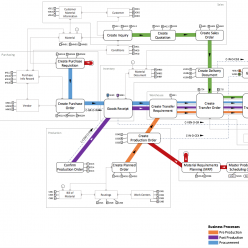Business leverages Big Data and Business Intelligence with ERP system. This not only accelerates decision-making process but also enacts effective business strategy.
But today, data resides everywhere in manufacturing—in Enterprise Resource Planning (ERP) systems, Product Lifecycle Management (PLM) systems, Manufacturing Execution Systems (MES) and Supplier Relationship Management (SRM) systems, in machine tools and in thousands of spreadsheets, files and folders across the company. Data also resides outside the enterprise, across the value chain with partners on both the supply and the sales sides. The goal is to break down organizational process, data and system silo and automate the collection of data across operations.
For example, collecting data across ERP system and Supplier Management system, cleaning and integrating those data enable business get the real-time insight and make better prediction. Moreover, access to real-time supply chain information helps identify issues before they happen, reduces inventory and potentially reduces capital requirements. Moreover, connecting to suppliers’ information enables location tracking, remote monitoring of inventory and reporting of parts and products as they move through the supply chain. All these information help manager to make decision and conduct business transformation.
